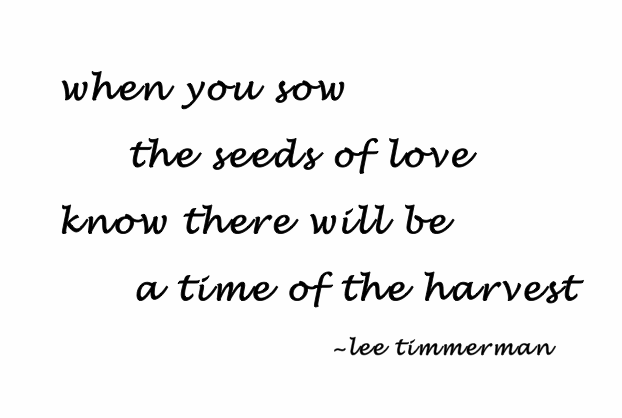the rhythm
of butterfly wings
shakes
the mountains
Focusing on the Breath
In our effort towards developing a healthy body and mind, we need to come to our breath. We must understand the importance of breath in our life. The average person will breathe approximately 500 cubic centimeters of oxygen per breath, yet our lung capacity is approximately 3500 cubic centimeters. The average person will breathe 16–22 times a minute. Someone doing deep diaphragmatic breathing would only need 3-6 breaths a minute. Not only does deep breathing provide more oxygen to the system, it also removes more carbon dioxide and toxins from the body. The average person is providing 1/7th of oxygen nutrition to the body and removing 1/7th of the toxins with each breath.
Proper breathing will affect us physically, mentally, and emotionally in a positive and healthy way. It is easy to see the need for oxygen nutrition when it is put into the context of: We can live without food for approximately 40 days before we die. We can live without water three to four days before we die. We can live only minutes without oxygen before we die. Oxygen is the primary nutritional need of the body and mind, yet most people will give little time to the breath.
By increasing the fullness of breath, more oxygen will be coming into the body and more toxins will be removed. When we realize the benefits of more oxygen, we will be more inclined to make the effort to improve our breathing habits. Stress, anxiety, inner conflict, and discord are a direct result of this lack of oxygen nutrition and build up of toxins in the body and mind. If we view oxygen as nutrition and approach it from a nutritional point of view, we will see the physiological need to change our breathing habits.
As we begin to take in more oxygen and get rid of more toxins, we will notice how calm and peaceful our mind is. A mind that is peaceful and calm will see and enjoy the diversity of life. The very act of proper breathing will bring about a tremendous change in our view of life, or our moods and attitudes.
The mind and the breath are interconnected. The thoughts we have will have different effects on our beliefs, emotions, and body. A deep calm breath will be accompanied with calm, joyful, and peaceful thoughts and feelings. A rapid breath or uneven breath will be accompanied by short agitated thoughts and frustration. This state of agitation has little clarity or benefit and is the underlying root cause or foundation that stress builds on. Almost all of these thoughts are non-essential to our happiness and our life, and can be easily gone beyond by simply changing the length of our breath. Diaphragmatic breathing allows us to transcend this realm of rapid, agitated thinking, thereby there will be no foundation for stress to build upon. This transformation to diaphragmatic breathing will be a major contributor to removing over 50% of the stress or agitated feelings in our life.
Wake up! You are in a state of deep sleep.
You can become free of misery;
you can understand your real goal
and your essential nature.”
The Upanishads 800-500 BC
Breath is part of the autonomic nervous system, so we can breathe without even thinking about it. When we bring our attention to the breath, we can change the depth, length, and frequency of our breath. How we breathe is basically just a habit we have formed. Because it is a habit, it is something we can change. When we understand that increased oxygen and reduced toxins will help us to be happier and healthier, we will be willing to take the time and make the effort to change our habits.
Taking control of the mind and changing our habits may seem like a difficult task. In contrast, taking control of our breath is simple, and the mind will follow, which makes changing our habits relatively easy.
Changing our breathing habits begins with simply taking full, gentle, deep diaphragmatic breaths every day. While doing diaphragmatic breathing, pay attention to how the body and mind respond. The mind will follow the breath, so when we regulate our breathing we will have better control of the mind. We can use diaphragmatic breathing to attain a calmer and more peaceful mind.
To develop proper breathing, we simply take a little time each day to practice deep diaphragmatic breathing. We take deep slow inhalations while we count from 1 to 12 as we inhale. If we can’t make it to 12, we choose a lower number that we can reach. Then we exhale to the same count. This inhalation is deep, slow, and even, filling both the lower and the upper chambers of the lungs, and we exhale both upper and lower chambers completely. The brief pauses between breaths should also be even. We take 5-10 minutes each hour, throughout the day, for this practice. We pay attention to the differences in how we felt before the breath exercise and how we feel afterwards. Once we begin to recognize the benefits we will be willing to change our breathing habit to diaphragmatic breathing.
Another breathing practice is called “Bellows Breathing.” It is a deep and full inhalation through the nostrils with four or five quick and short exhalations through the mouth to expel all the air from the lungs. This exercise will help our body and mind to relax and calm down. When we concentrate on our breath, we will be focused on what we are doing. This will relax us and this relaxation will allow us to take an even deeper breath. The inhalation is done slowly and gently. The exhalation is done with four or five quick short and moderate exhalations. Both the 1–12 breathing technique and the Bellows Breathing will help us change our breathing habits if we do them consistently by making us more aware of our breath.
I can’t emphasize enough the importance of proper breathing. Proper breathing is the single most important nutrient for health and happiness. The breath is what regulates a healthy body and mind. Proper breathing helps to make our goals attainable and our life filled with energy and joy. The most valuable nutrient for the body and mind is oxygen, and diaphragmatic breathing provides the maximum amount of oxygen.
When we have proper breathing habits, both nostrils will be open fairly equally, both hemispheres of the brain will have greater accessibility, and we can function at peak or full potential. When both nostrils are open the communication between left hemisphere (reasons and analyzes, objective thinking) and right hemisphere (creativity and intuition, and subjective thinking) is more open and balanced. This starts with the regulation of the breath.
The very fountain of youth is in the breath. You will feel more energized, healthy, and happy with diaphragmatic breathing.
The wise don’t expect to
find life worth living;
they make it that way.
Anonymous
Proper breathing brings a calmness and a peace, thereby having more energy and enthusiasm, and willpower to work and play with. Better health, more happiness and joy all start with the breath. Without regulating the breath, there will be little control of the mind, without directing the mind we cannot be a master of our destiny.
Breath of Life, Breath of Joy
In the beginning, we can begin to make changes in our life by starting with 10 minutes an hour, of deep breathing. We continue to increase how long we do the diaphragmatic breathing until eventually it will be the way we breathe normally. The next time you are feeling stressed, agitated, angry or irritated, try 10 minutes of slow, deep diaphragmatic breathing. You will be amazed how this breathing exercise can transform your mood to that of a calm mind that now has clarity. Now, it isn’t just the breath of life, it has become the breath of joy and happiness. With this knowledge, we now have the ability to determine how much health, happiness and joy are in our life, while we work towards the accomplishment of our goals.
Having a peaceful life doesn’t mean we have to go off to the mountains or sit in a garden all day. It means we are at peace with our self and the life we are living. This lets us accomplish and fulfill the things we enjoy, allows us to fulfill our very purpose. It is being at peace with the activities we do.
EXERCISES
You owe it to yourself to try a new approach and make time to experiment with these breathing techniques, and you will notice positive and uplifting results.
- Do 10 minutes of deep, slow diaphragmatic breathing counting from 1-12 on the inhalation and 1-12 on the exhalation.
- Do diaphragmatic breathing throughout the day, a little each hour.
- Do “bellows breathing” for 10 minutes. Inhale deeply through the nostrils and then exhale fully with four to five short rapid expulsions of air through the mouth.
- When feeling stress, anxiety, frustration, or anger, do 10 minutes of deep diaphragmatic breathing,which will calm the mind and emotions, and allow us to redirect our thoughts to the positive and uplifting.
The very fountain of youth is in the breath. The breath is the link between body, mind, and spirit. When there is harmony between body, mind, spirit, we can accomplish anything.


